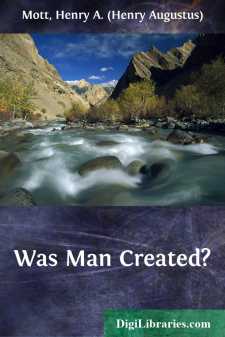Science
- Astronomy 18
- Biology 40
- Chemistry 13
- Electricity 1
- General 38
- History 6
- Light 1
- Paleontology 2
- Philosophy & Social Aspects 1
- Physics 3
- Relativity 2
- Study & Teaching 1
- Waves & Wave Mechanics 1
Science Books
Sort by:
by:
William Crookes
THE CHEMICAL HISTORY OF A CANDLE LECTURE I. A CANDLE: THE FLAME—ITS SOURCES—STRUCTURE—MOBILITY—BRIGHTNESS. I purpose, in return for the honour you do us by coming to see what are our proceedings here, to bring before you, in the course of these lectures, the Chemical History of a Candle. I have taken this subject on a former occasion; and were it left to my own will, I should prefer to repeat...
more...
PREFACE. This work was originally written to be delivered as a lecture; but as its pages continued to multiply, it was suggested to the author by numerous friends that it ought to be published in book-form; this, at last, the author concluded to do. This work, therefore, does not claim to be an exhaustive discussion of the various departments of which it treats; but rather it has been the aim of the...
more...
by:
Joseph Priestley
THE PREFACE. One reason for the present publication has been the favourable reception of those of my Observations on different kinds of air, which were published in the Philosophical Transactions for the year 1772, and the demand for them by persons who did not chuse, for the sake of those papers only, to purchase the whole volume in which they were contained. Another motive was the additions to my...
more...
THE NEW HEAVENS Go out under the open sky, on a clear and moon-less night, and try to count the stars. If your station lies well beyond the glare of cities, which is often strong enough to conceal all but the brighter objects, you will find the task a difficult one. Ranging through the six magnitudes of the Greek astronomers, from the brilliant Sirius to the faintest perceptible points of light, the...
more...
by:
Charles Fort
A procession of the damned. By the damned, I mean the excluded. We shall have a procession of data that Science has excluded. Battalions of the accursed, captained by pallid data that I have exhumed, will march. You'll read them—or they'll march. Some of them livid and some of them fiery and some of them rotten. Some of them are corpses, skeletons, mummies, twitching, tottering, animated by...
more...
CHAPTER I. . . . The justification of all persons who have freed themselves from toil is now founded on experimental, positive science. The scientific theory is as follows:— “For the study of the laws of life of human societies, there exists but one indubitable method,—the positive, experimental, critical method “Only sociology, founded on biology, founded on all the positive sciences, can...
more...
PREFACE The object of this book is to give an account of the science of Astronomy, as it is known at the present day, in a manner acceptable to the general reader. It is too often supposed that it is impossible to acquire any useful knowledge of Astronomy without much laborious study, and without adventuring into quite a new world of thought. The reasoning applied to the study of the celestial orbs is,...
more...
THE SCIENTIFIC EVIDENCES OF ORGANIC EVOLUTION. Although it is generally recognised that the Origin of Species has produced an effect both on the science and the philosophy of our age which is without a parallel in the history of thought, admirers of Mr. Darwin's genius are frequently surprised at the ignorance of his work which is displayed by many persons who can scarcely be said to belong to the...
more...
CHAPTER I ON RAYS PROPAGATED IN STRAIGHT LINES s happens in all the sciences in which Geometry is applied to matter, the demonstrations concerning Optics are founded on truths drawn from experience. Such are that the rays of light are propagated in straight lines; that the angles of reflexion and of incidence are equal; and that in refraction the ray is bent according to the law of sines, now so well...
more...
CHAPTER I. THE ASTRONOMICAL OBSERVATORY. Early Astronomical Observations—The Observatory of Tycho Brahe—The Pupil of the Eye—Vision of Faint Objects—The Telescope—The Object-Glass—Advantages of Large Telescopes—The Equatorial—The Observatory—The Power of a Telescope—Reflecting Telescopes—Lord Rosse's Great Reflector at Parsonstown—How the mighty Telescope is...
more...











